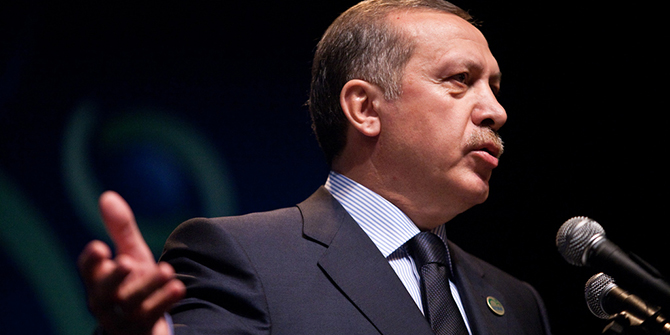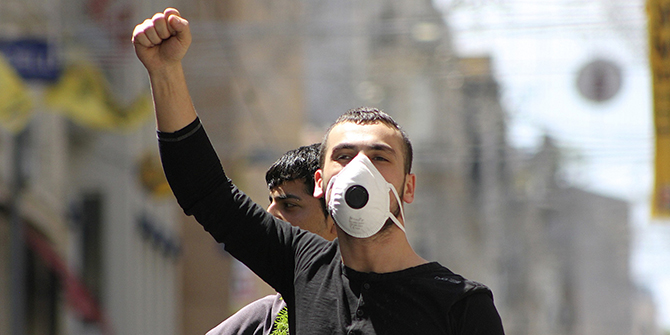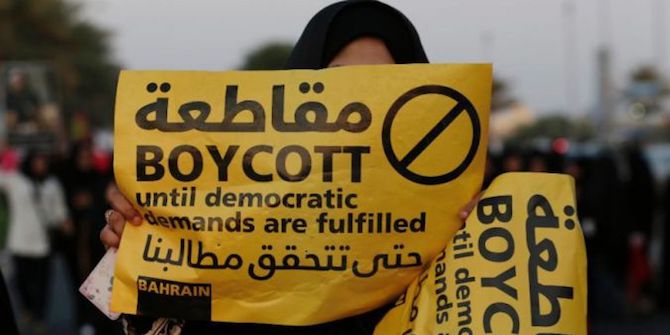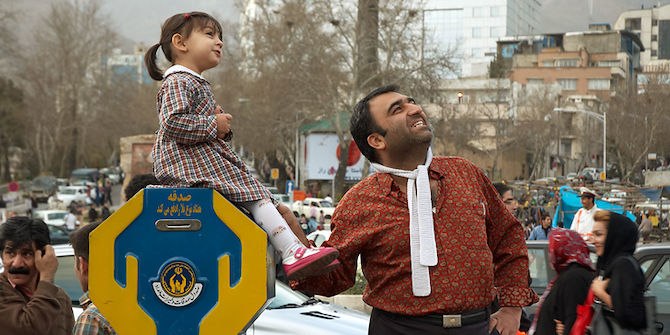by Zeynep Kaya
The elections on Sunday June 7 were the most important general elections in recent Turkish political history. With a huge turnout, more women in parliament, better Kurdish political representation and a clear ‘no’ to a presidential system, the future of Turkish democracy looks promising. However, a hung parliament and potential early elections might jeopardise this. Regrettably, the AK Party’s initial interpretation of the elections, particularly regarding the HDP’s success, is an unfortunate start.

The outcome of the elections represents a fascinating push for Turkey to become a more pluralist democratic country. A resounding 87% turnout showed Turkish voters’ interest in shaping the political future of the country and the majority said ‘no’ to changing the parliamentary system to a presidential one. The number of female MPs increased from 76 to 96; yet the most important outcome of the elections is the 13.1% of votes that went to the HDP (Peoples’ Democracy Party). For the first time, Kurdish politicians were present as a party in the parliament not as independent MPs. Moreover, in the previous parliament there were 36 independent MPs affiliated with an earlier incarnation of the HDP (the BDP – Peace and Democracy Party), but today, this number has increased to 80. Potentially, this is promising for the future of Turkish democracy and the Kurdish peace talks. However, this will very much depend on whether a new government can be formed and, if so, what shape it takes. Unfortunately, the Justice and Development Party’s (AK Party, also known as AKP) initial reaction of the HDP’s success does not bode well.
The AK Party lost 9% of its vote share, from 49.9% in the 2011 elections to 40.8% with its seats decreasing from 327 to 258. The HDP reaching the extremely high 10% threshold (a party needs to receive at least 10% of the national vote to enter the parliament) was the biggest blow to the AK Party’s aspirations to form yet another majority government. The deputy Prime Minister Bulent Arinc in his post-election statement claimed that the Nationalist People Party (MHP) and the Republican People’s Party (CHP) enabled HDP’s success and he said the HDP was used as a spearhead pushed by these two parties.
It is true that the MHP and the CHP saw the benefits of having the HDP in parliament – simply, a smaller number of AK Party seats. The AK Party needed at least 276 seats to form a single party government and 367 seats to be able to change the constitution and move Turkey towards a presidential system, which is now impossible. During the election campaigns, both the MHP and the CHP softened their anti-HDP discourse and used a more consensual language, much to the AK Party’s disappointment. A proportion of non-Kurdish voters in urban areas voted for the HDP because of its party programme and rhetoric based on democracy, pluralism, gender-equality, LGBT rights and environmentalism, but also as an anti-AK Party strategy to help the HDP pass the 10% threshold. However, if what Arinc says was true, the HDP should’ve received more votes in areas where the AK Party has consistently been the biggest party, but this didn’t happen. The outcome indicates that the HDP barely received 2% of the votes in these areas.
The HDP passed the threshold and the AK Party lost a big proportion of its support base due to reasons far more influential than supposed support from other parties. Basically, people did not want to see another single party government formed by the AK Party. Erdogan’s actions since he became president have gone beyond a Turkish president’s constitutional area of activity. He has been behaving more like a head of government than a president, which is supposed be a non-partisan neutral position according to the Turkish constitution. For instance, he was at the centre of the AK Party election campaign, giving speeches every day in support of the party, bashing other parties, and openly declaring his biased position towards the AK Party. Increasingly, larger proportions of Turkish society find Erdogan and the AK Party’s authoritarian attitude, their tendency to push the boundaries set by legal norms and regulations, their polarising rhetoric and their assumption that the Turkish electorate can be convinced through populist policies and discourse very vexing.
Contrasting with this arrogant and polarising attitude, the co-leader of the HDP, Selahattin Demirtas has adopted a consensual style and his pluralist, democratic, and egalitarian rhetoric found him many friendly ears among the Turkish society. The ongoing peace talks and the halt of the military conflict also have given some level of legitimacy to the party and facilitated the shift in votes towards the HDP. For example, AK Party supporters in eastern and southeastern Turkey shifted their support to the HDP. Similarly, the MHP’s vote share increased from 13% to 16% across Turkey, mainly as a response to the Kurdish peace process. All these reasons contributed to the AK Party’s loss of the majority.

Clearly, Arinc’s blame of the MHP and the CHP for the HDP’s success shows that the AK Party does not see the electoral outcome as a reaction to their authoritarian and paternalist single-party rule. Furthermore, it overlooks the possibility that electors might have chosen to vote strategically rather than ideologically. The AK Party’s insistence on blaming other parties also reveals its top-down and increasingly elitist political mentality – a mentality that underestimates public opinion and perceives the elections through the prism of populism instead of pluralism.
What’s more, the AK Party’s initial response shows an apparent unawareness of the impact of recent events on public opinion. The Gezi protests in mid-2013 and the subsequent severe government and police response to the protestors not only revealed the authoritarianism and intolerance of the AK Party, but also its social engineering attempts to create a conservative Turkish society. The corruption scandal, which began in 2013 and involved four ministers and Erdogan’s family, generated also a significant reaction among the Turkish population. The scandal was initiated by the Gulenists’, a transnational Islamist group led by Abdullah Gulen who preaches a moderate blend of Islam. In response, the AK Party government heightened pressure on the Gulenists (the parallel state, as the party calls them now). Lastly, the AK Party’s aggressive and unconstructive foreign policy in the Middle East, which has sectarian tones, and the decline in Turkey’s economic growth are other important factors that led to the decrease in the party’s vote share. In a nutshell, the AK Party’s conception of the HDP’s success as generated by the MHP and the CHP is unfounded.

In any case, the HDP is now in parliament and for the first time in Turkish political history, Kurds are represented as a party. This will surely impact the Kurdish peace process and further legitimise Kurdish politics in Turkey. Not being able to pass the threshold would’ve led the Kurds to put emphasis on the high electoral threshold system and further restrain PKK-government relations. However, to what extent the HDP is able to influence the peace process depends on how the new government handles the talks. Political representation in the parliament is an important step in securing the peace process. Although initiated by the AK Party, the peace process was mainly maintained thanks to the public support for peace despite the government’s own sabotaging behaviour at times and the Turkish nationalist opposition. Hopefully, the next government will continue the peace talks with the reality of the HDP as a more integral part of Turkish politics in mind.
The important determinant will be the new government or whether a new government will form at all. Typical to post-election processes with no outright majority, a number of scenarios and readings between the lines of leaders’ speeches are dominating media discussions at the moment. The AK Party will now either form a minority government or have to talk to other parties to generate a coalition government. If the new AK Party leader is not successful in forming the coalition or if a new coalition cabinet does not pass the confidence vote within 45 days, the President can call for elections.
An early election might potentially disrupt the peace process and the trust that Kurdish voters have in the Turkish political system. Erdogan and the AK Party might consider the early election option as a serious possibility, and in doing so, may feed into the negative memory of instability of coalition governments of the 90s. Still, the elections showed that most of the population does not appreciate the party’s increasingly authoritarian rule, prefers a coalition government and is happy to see Kurds represented in the parliament. These are important lessons for all parties involved. Unfortunately all this may not matter. A cautious hope is in order, as Turkey might be facing a process of instability generated by the AK Party to show the ‘vices’ of parliamentary systems.
 Dr Zeynep Kaya is a Research Fellow at the LSE Middle East Centre. She completed her PhD in International Relations at LSE on the interaction between international norms and ethnicist conceptions of territorial identity with a focus on the Kurdish case. She is currently working on her book titled The Idea of Kurdistan: International Norms and Nationalism for the University of Pennsylvania Press.
Dr Zeynep Kaya is a Research Fellow at the LSE Middle East Centre. She completed her PhD in International Relations at LSE on the interaction between international norms and ethnicist conceptions of territorial identity with a focus on the Kurdish case. She is currently working on her book titled The Idea of Kurdistan: International Norms and Nationalism for the University of Pennsylvania Press.






